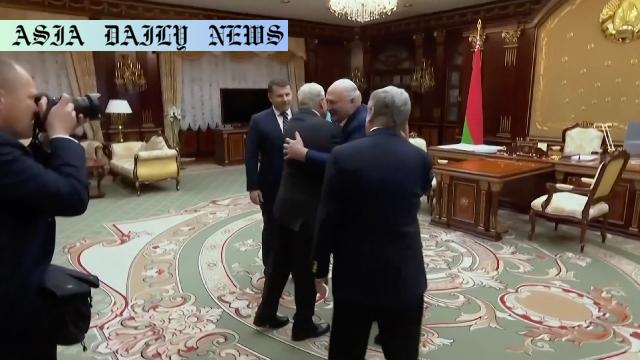Belarus Release: 14 people freed, including two detained Japanese nationals, as US envoy visits amid broader geopolitical tensions.
- Key Point 1: Belarus released 14 detainees, including 2 Japanese nationals, as part of apparent diplomatic developments.
- Key Point 2: One Japanese man was detained since the August 2020 protests; the other, detained for suspected spying last year.
- Key Point 3: US special envoy Keith Kellogg played a vital role in discussions.
- Key Point 4: Japan urges Belarus to release one more Japanese detainee residing in custody.

Introduction: Belarus Takes a Significant Diplomatic Step
In a move that seemed to align with diplomatic negotiations, Belarus released 14 detainees, including two Japanese nationals. The release coincided with a visit by Keith Kellogg, the US special envoy for Ukraine. This development sheds light on the complex intersections between Belarus, Japan, and US-led efforts in navigating geopolitical and humanitarian concerns.
Background: The Cases of the Japanese Nationals
The Japanese embassy confirmed that two of its detained citizens were among the released group. While details were sparse, it was noted that one of the individuals had been detained since August 2020, following widespread protests triggered by the controversial Belarusian presidential election. This man had received a 16-year prison sentence for his alleged involvement in the demonstrations. The second, detained in December 2024, had been accused of espionage after being found filming a bridge in the Gomel region of southeastern Belarus.
The US Government’s Role in the Release
The timing of the release appears closely tied to the visit of US special envoy Keith Kellogg to Belarus. The US government has long been vocal about human rights issues and the political climate in the country. It is possible that Kellogg’s diplomatic engagement included discussions about detainees, especially those with strong international ties. Japan expressed its deep gratitude to the US for its role in securing the release, demonstrating the significance of multilateral efforts in addressing such sensitive issues.
Humanitarian and Diplomatic Implications
While the news of the release is a welcome development, it also serves as a reminder of ongoing issues within Belarus. The country remains under scrutiny for its responses to civil dissent and accusations of human rights violations. The plight of one remaining Japanese national still in detention underscores the incomplete nature of these efforts. Japan has committed to advocating for the individual’s release, signaling the importance of continued diplomatic engagement.
Conclusion: A Step Forward Amidst Broader Challenges
The release of the 14 detainees, including two Japanese nationals, marks a significant moment in Belarus’s diplomatic history. It reflects the power of collaborative international efforts to address human rights concerns. However, it also underscores the wider issues at play, including tensions within Belarus and its relationships with other nations. The spotlight now turns to further actions that both Belarus and the international community will take to resolve ongoing humanitarian concerns.



Commentary
Reflections on Belarus’s Diplomatic Gesture
The recent release of 14 detainees, including two Japanese nationals, marks a moment of cautious optimism in Belarus’s often opaque geopolitical narrative. On the surface, the move is a humanitarian act that deserves commendation. However, it is essential to explore the broader implications of this decision and what it may signify regarding Belarus’s international strategies.
The Role of Japan and US Collaboration
The gratitude expressed by Japan toward the US government highlights the power of multilateral diplomacy. It is rare to see such overt acknowledgments of collaborative efforts in what often feels like a fragmented global arena. While the direct influence of US envoy Keith Kellogg on this outcome is not entirely clear, his presence underscores the critical role of seasoned diplomats in addressing complex international issues like detainment and human rights violations.
What This Means for Human Rights in Belarus
Despite this progress, deeper questions about Belarus’s conduct remain unanswered. The country has faced scrutiny for its handling of dissent, freedom of expression, and political opposition. The arrest of individuals over protests and alleged espionage underlines the harsh realities faced by those involved, either intentionally or unintentionally, in activities that clash with the state’s interests.
The Road Ahead
The release serves as a beacon of hope, but it should also be a call to action. Nations like Japan must stay the course in securing the release of their remaining detainees and advocating for essential reforms within Belarus. Likewise, the international community must focus on sustained engagement to ensure that gestures like these evolve into lasting change. Only then can we hope for a global environment where human rights violations are actively and effectively curtailed.